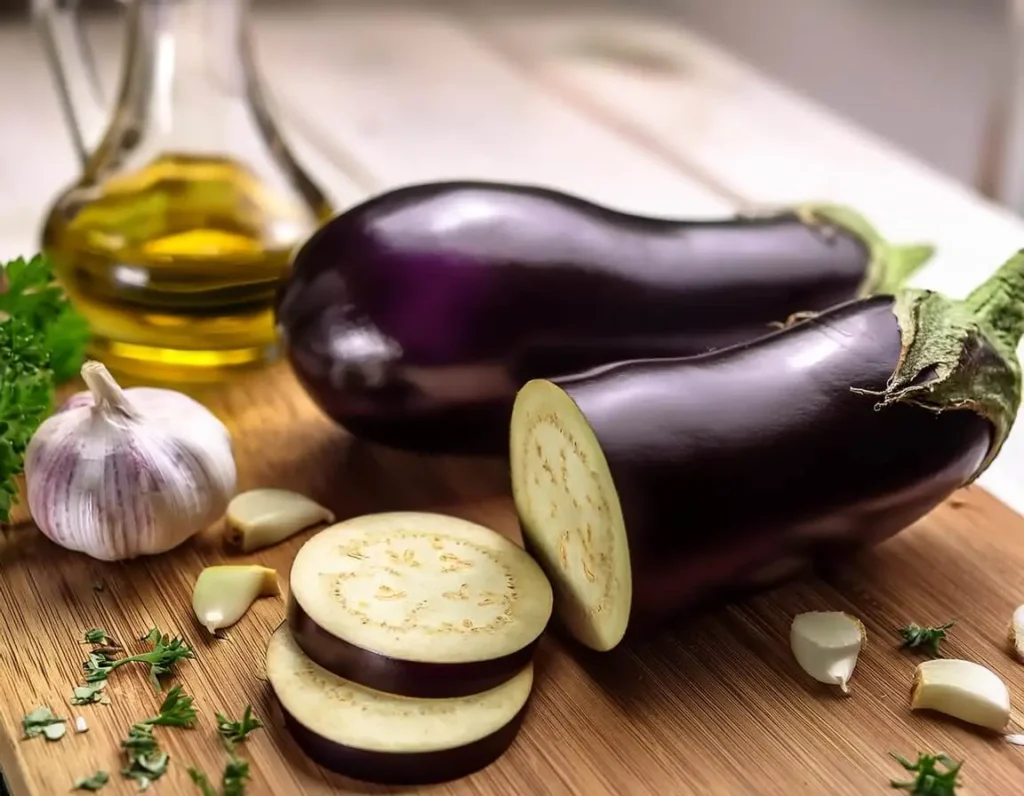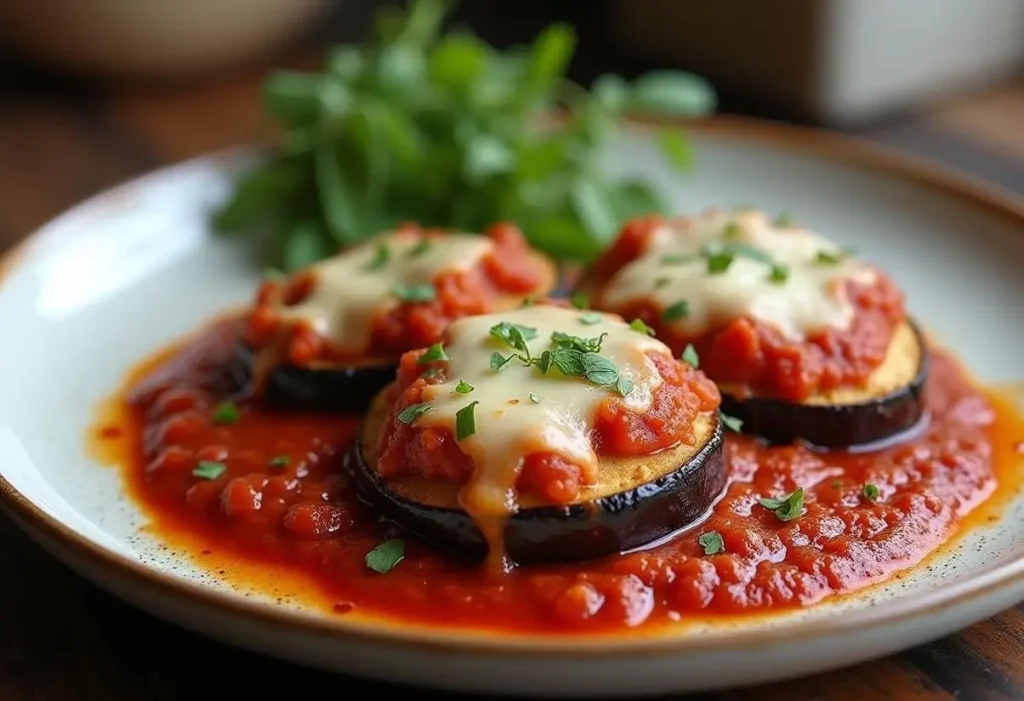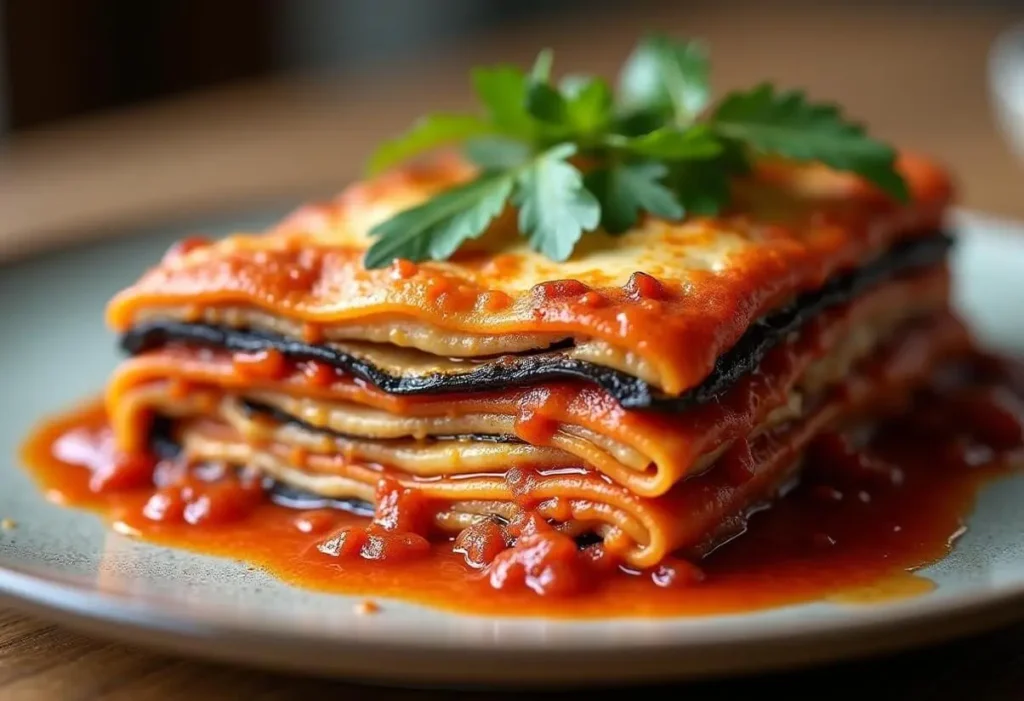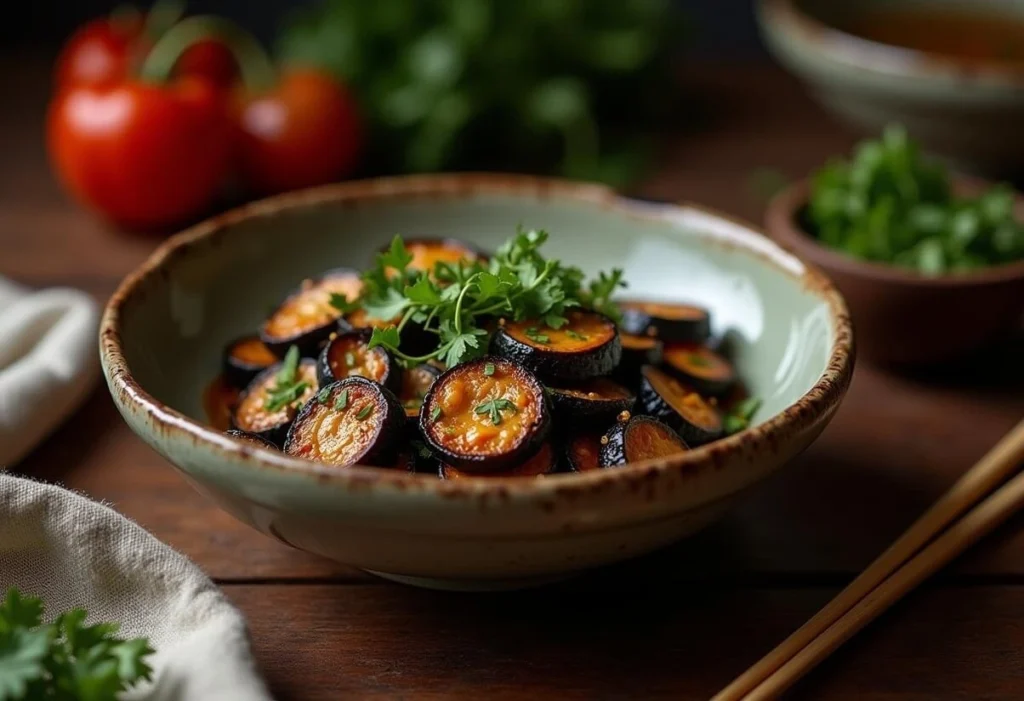Introduction
Eggplant, with its rich texture and adaptability, is a favorite in plant-based cooking. A common query often arises: can vegans eat eggplant? The answer is simple—yes, they absolutely can! Eggplant is not only vegan-friendly but also a staple in many plant-based diets due to its versatility and nutritional benefits. Its ability to absorb flavors and provide a hearty texture makes it an excellent choice for creating vegan versions of classic dishes.
One popular example is vegan eggplant parmesan, a satisfying alternative to the traditional recipe that replaces dairy and eggs with plant-based ingredients. Beyond parmesan, eggplant is a star ingredient in recipes like lasagna, stir-fries, and dips like baba ghanoush. This article delves into the role of eggplant in vegan diets, shares delicious recipes, and answers common questions about its compatibility with vegan lifestyles.

Can Vegans Eat Eggplant?
The short answer to the question “Can vegans eat eggplant?” is yes! Eggplant is a plant-based food, making it completely suitable for vegans. As a fruit (technically classified as a berry) but commonly treated as a vegetable in culinary contexts, eggplant fits seamlessly into vegan and vegetarian diets. Its mild flavor and meaty texture make it a versatile ingredient in plant-based cooking.
Is Eggplant Vegan?
Yes, eggplant is vegan because it comes entirely from plants and contains no animal-derived components. It’s also a common ingredient in dishes designed for vegetarians and vegans alike. Whether used as a main ingredient in meals like vegan eggplant parmesan or a base for dips such as baba ghanoush, its adaptability is unmatched.
Can Vegetarians Eat Eggplant?
Not only can vegetarians eat eggplant, but it’s also a popular choice among those looking for satisfying, meat-free options. Eggplant’s hearty texture mimics that of meat, making it an excellent substitute in recipes like eggplant burgers, lasagna, and stir-fries.
Nutritional Benefits of Eggplant
Eggplant is not just versatile—it’s also packed with nutrients. It’s low in calories, making it a great option for those looking to maintain a healthy weight. It’s rich in fiber, which supports digestion, and contains important vitamins and minerals like vitamin C, vitamin K, potassium, and manganese. Additionally, eggplant contains antioxidants, particularly nasunin, which is found in its purple skin and is known for its brain-protecting properties.
In summary, eggplant is not only vegan-friendly but also a nutritious and versatile food that deserves a place in any plant-based diet. From hearty main dishes to creative sides, its possibilities are endless.
Eggplant is not only versatile but also packed with nutrients that support overall health. Learn more about the nutritional benefits of eggplants from this resource.
Vegan Eggplant Parmesan: A Classic Dish Reinvented
What Makes a Dish Vegan?
A dish is considered vegan when it contains no animal-derived ingredients. This means no meat, dairy, eggs, or any byproducts like gelatin or honey. Traditional eggplant parmesan, though centered around a plant-based ingredient (eggplant), typically includes cheese made from cow’s milk and eggs used in the breading process. These components make it unsuitable for a vegan diet.
To make eggplant parmesan vegan-friendly, simple and delicious substitutions can be used. Instead of dairy-based cheese, plant-based mozzarella or nutritional yeast can replicate the cheesy flavor. For breading, alternatives like a flaxseed “egg” (made by mixing ground flaxseeds with water) or aquafaba (the liquid from a can of chickpeas) can replace traditional eggs. These swaps maintain the dish’s flavor and texture while aligning with vegan principles.
Step-by-Step Recipe: Vegan Eggplant Parmesan
This recipe for vegan eggplant parmesan without breadcrumbs is both easy and flavorful, making it a perfect choice for plant-based eaters.
Ingredients:
- 2 large eggplants, sliced into ½-inch rounds
- 1 cup unsweetened plant-based milk (e.g., almond, soy)
- 2 tbsp ground flaxseed + 6 tbsp water (flax egg substitute)
- 1 ½ cups panko breadcrumbs (vegan-friendly)
- 1 cup all-purpose flour
- 2 cups marinara sauce
- 1 ½ cups plant-based mozzarella cheese
- 2 tbsp nutritional yeast (optional, for cheesy flavor)
- 1 tsp garlic powder
- 1 tsp Italian seasoning
- Salt and pepper to taste
- Olive oil for frying or baking
Instructions:
- Prepare the eggplant: Lay the eggplant slices on a baking sheet and sprinkle with salt. Let them sit for 20 minutes to remove excess moisture and bitterness. Pat dry with a paper towel.
- Set up breading station: In one bowl, mix flour with garlic powder, Italian seasoning, salt, and pepper. In another bowl, whisk the plant-based milk with the flax egg. Place breadcrumbs in a third bowl.
- Bread the eggplant: Dip each slice into the flour, then into the flax egg mixture, and finally coat with breadcrumbs.
- Cook the eggplant: Fry slices in a skillet with olive oil until golden brown, or bake at 400°F (200°C) on a greased baking sheet for 20–25 minutes, flipping halfway.
- Assemble and bake: In a baking dish, layer marinara sauce, cooked eggplant slices, and plant-based mozzarella. Repeat until all ingredients are used. Top with nutritional yeast if desired.
- Bake: Bake at 375°F (190°C) for 20–25 minutes until bubbly and golden on top.

Tips for Success:
- For extra crispiness, opt for panko breadcrumbs over traditional ones.
- Use a high-quality marinara sauce for a richer flavor.
- Avoid soggy eggplant by salting and patting it dry before cooking.
Exploring More Vegan Eggplant Recipes
Vegan Eggplant Lasagna
Eggplant is an excellent pasta substitute in lasagna, offering a rich and satisfying alternative to traditional noodles. Using thin slices of eggplant not only makes the dish gluten-free but also infuses it with a delightful smoky flavor. A perfect vegan eggplant lasagna layers tender eggplant slices with rich marinara sauce, creamy plant-based ricotta, and flavorful vegetables.
Step-by-Step Guide:
- Prepare the eggplant: Slice 2 large eggplants lengthwise into ¼-inch thick strips. Lay them on a baking sheet, sprinkle with salt, and let sit for 20 minutes. Rinse and pat dry.
- Cook the slices: Lightly brush with olive oil and bake at 400°F (200°C) for 15 minutes until softened, or grill for added smokiness.
- Make the ricotta: Blend 2 cups of firm tofu, 2 tbsp lemon juice, 2 tbsp nutritional yeast, 1 tsp garlic powder, and salt to taste until smooth.
- Assemble the lasagna: In a baking dish, spread a layer of marinara sauce. Add a layer of eggplant slices, spread tofu ricotta, and sprinkle with sautéed vegetables like spinach or mushrooms. Repeat until all ingredients are used, ending with marinara and vegan mozzarella.
- Bake: Bake at 375°F (190°C) for 30–35 minutes until bubbly and golden.

Tips for Success:
- To avoid watery lasagna, pre-cook the eggplant slices and use a thick marinara sauce.
- Add layers of roasted zucchini or bell peppers for more flavor variety.
Other Easy Vegan Eggplant Recipes
Eggplant is one of the most versatile ingredients in vegan cooking. Here are a few simple yet delicious recipes to try:
- Grilled Eggplant: Slice eggplant into rounds, marinate with olive oil, garlic, and herbs, then grill until tender. Serve as a side dish or use in sandwiches.
- Baba Ghanoush (Roasted Eggplant Dip): Roast a whole eggplant until soft. Scoop out the flesh and blend with tahini, lemon juice, garlic, and salt for a creamy, smoky dip.
- Stir-Fried Eggplant: Cube eggplant and stir-fry with garlic, ginger, soy sauce, and a touch of sesame oil for a quick and flavorful side dish.
- Eggplant Caponata: Sauté diced eggplant with tomatoes, capers, olives, and herbs for a Mediterranean-inspired appetizer or topping.
These recipes highlight the simplicity and accessibility of eggplant. With just a few basic ingredients, you can create a variety of dishes that cater to any taste or occasion.
Common Questions About Eggplant and Veganism
Can Vegans Eat Any Vegetables?
Yes, vegans can eat all vegetables, including eggplant, as plant-based diets are inherently inclusive of vegetables. Vegetables are not only a staple for vegans but also a primary source of essential nutrients such as vitamins, minerals, fiber, and antioxidants. They play a vital role in ensuring that a vegan diet is balanced and nutritious.
Eggplant, for example, is a popular choice due to its versatility and heartiness. It provides a satisfying texture that mimics meat in many recipes, making it a go-to ingredient for vegan dishes like lasagna, stir-fries, and dips. Additionally, vegetables are low in calories and rich in health benefits, making them ideal for anyone seeking a healthy lifestyle. Including a variety of vegetables in your diet ensures you enjoy diverse flavors and reap the maximum nutritional benefits.
What Is a Substitute for Eggs in Breading Eggplant?
When breading eggplant for dishes like vegan eggplant parmesan, eggs are often used as a binding agent to adhere the breadcrumbs. However, several vegan-friendly alternatives work just as effectively:
- Flaxseed Egg: Mix 1 tablespoon of ground flaxseed with 2.5 tablespoons of water. Let it sit for 5 minutes to form a gel-like consistency. This mimics the stickiness of eggs and works well in breading.
- Aquafaba: The liquid from a can of chickpeas can be whipped lightly and used as a direct replacement for eggs. It provides a sticky coating that helps breadcrumbs adhere.
- Plant-Based Milk: Unsweetened almond, soy, or oat milk can be used to moisten the eggplant slices before coating them with breadcrumbs.
Tips for Success:
- For a firmer breading, dip the eggplant in flour first, followed by the egg substitute, and then breadcrumbs.
- Lightly press the breadcrumbs onto the slices to ensure an even coating.
- Bake or fry the breaded eggplant to achieve a crispy texture.
Can Vegans Eat Unfertilized Eggs?
No, vegans do not eat unfertilized eggs or any eggs at all. While unfertilized eggs do not develop into chicks, they are still animal products. Vegans avoid eggs for ethical, environmental, and health reasons.
From an ethical standpoint, vegans oppose the commercial egg industry due to the mistreatment of hens and the exploitation of their reproductive systems. Even in cases of backyard hens, vegans often avoid eggs to respect animals’ autonomy and their right to live free from human interference.
Additionally, many vegans choose to avoid eggs due to their environmental impact, as large-scale egg production contributes to deforestation and greenhouse gas emissions. By eliminating eggs from their diet, vegans stay true to their commitment to a cruelty-free and sustainable lifestyle.
Is Eggplant a Meat or Vegetable?
Eggplant often sparks curiosity about its classification. Botanically, eggplant is a fruit—specifically, a berry—because it develops from the flowering part of the plant and contains seeds. However, in culinary terms, eggplant is treated as a vegetable due to its savory flavor and use in cooking. This dual identity makes it a unique ingredient that bridges the gap between scientific classification and culinary tradition.
Eggplant as a Meat Substitute
Eggplant’s hearty texture and ability to absorb flavors make it a popular meat substitute in vegan cooking. Its firm yet tender consistency mimics the mouthfeel of meat, making it an ideal alternative in dishes that traditionally rely on animal proteins. For instance, eggplant bacon is a savory, smoky alternative made by thinly slicing eggplant, marinating it in seasonings like liquid smoke and soy sauce, and baking until crispy. Similarly, eggplant-based burgers utilize its dense texture to create patties that hold together well and deliver a satisfying bite.
Why Eggplant Works as a Meat Substitute
Eggplant’s adaptability lies in its spongy interior, which absorbs marinades and seasonings effortlessly. This characteristic allows it to take on a wide range of flavors, from smoky and spicy to sweet and tangy. Additionally, its natural umami taste enhances its appeal as a meat alternative, especially in dishes like vegan eggplant parmesan, lasagna, and stir-fries.
In summary, while eggplant is neither meat nor strictly a vegetable, it serves as a culinary chameleon in plant-based diets. Its versatility and texture make it a standout ingredient for creating satisfying vegan dishes that replicate the experience of eating meat without compromising on flavor or nutrition.
Tips for Cooking Eggplant Perfectly Every Time
Eggplant can be a star ingredient in many dishes, but it requires a few tricks to achieve the best texture and flavor. Here are some practical tips to help you master cooking eggplant, making it a key player in your easy vegan eggplant recipes.
1. Reduce Bitterness
Eggplant’s bitterness, often found in older or larger specimens, can detract from its flavor. To minimize this:
- Salt the slices: Sprinkle salt generously over eggplant slices and let them sit for 20–30 minutes. This process draws out excess moisture and reduces bitterness.
- Rinse and pat dry: After salting, rinse the eggplant thoroughly and pat it dry with a paper towel to remove any residual salt.
2. Improve Texture
Eggplant’s spongy texture can be tricky to work with, but these methods help achieve the desired consistency:
- Choose the right cooking method: Baking, grilling, and frying are excellent ways to create a firm, tender texture. Avoid boiling, as it can make eggplant mushy.
- Pre-cook before layering: If using eggplant in layered dishes like lasagna, bake or grill the slices first to prevent them from releasing too much moisture during cooking.
3. Enhance Flavor
Eggplant is like a blank canvas, absorbing flavors beautifully. Pair it with robust seasonings to create depth in your dishes:
- Use marinades: Marinate eggplant in olive oil, garlic, lemon juice, and herbs like rosemary or thyme for a rich, flavorful base.
- Add spices: For a bold taste, season with smoked paprika, cumin, or curry powder. These flavors complement eggplant’s natural earthiness.
- Pair with umami-rich ingredients: Combine eggplant with miso, soy sauce, or nutritional yeast to boost its savory profile.

By following these tips, you’ll elevate your eggplant dishes to the next level, ensuring every recipe is flavorful, satisfying, and perfectly textured.
Conclusion: Embracing Eggplant in Vegan Diets
Eggplant is a standout ingredient in vegan diets due to its versatility, nutrition, and ability to transform into hearty, flavorful dishes. So, can vegans eat eggplant? Absolutely! Eggplant is not only vegan-friendly but also a perfect canvas for plant-based creativity. Its unique texture and ability to absorb flavors make it ideal for classic recipes like vegan eggplant parmesan, lasagna, and baba ghanoush.
Packed with fiber, vitamins, and antioxidants, eggplant supports a healthy lifestyle while adding depth and variety to meals. Whether grilled, roasted, baked, or fried, eggplant fits seamlessly into a wide array of recipes, offering endless possibilities for creating satisfying and delicious dishes.

Now it’s your turn to explore the versatility of eggplant in your kitchen. Try your hand at vegan eggplant parmesan or experiment with other easy vegan eggplant recipes like stir-fries and dips. With a few simple techniques, you can unlock the full potential of this incredible ingredient and take your vegan cooking to the next level.

